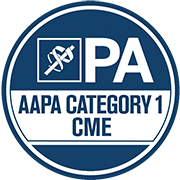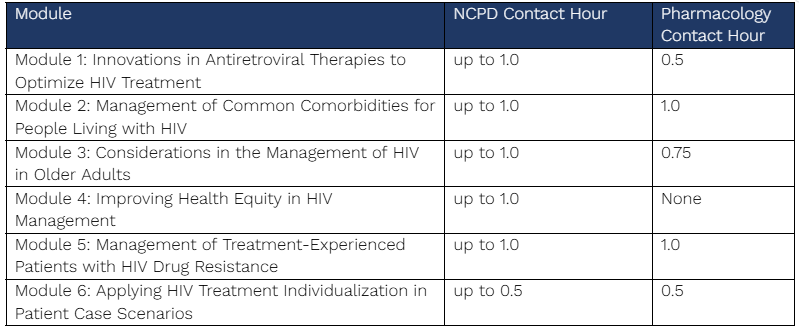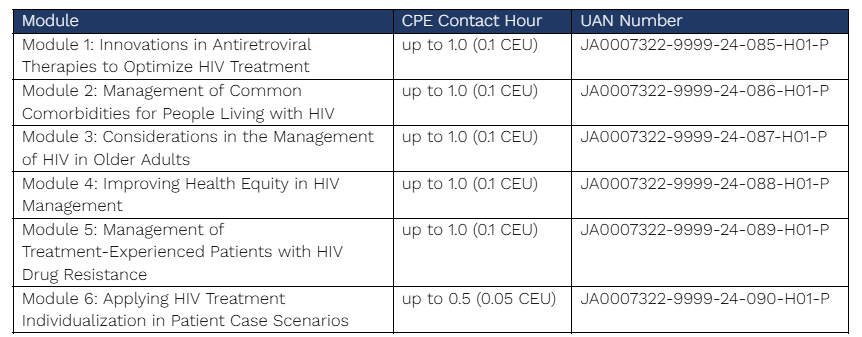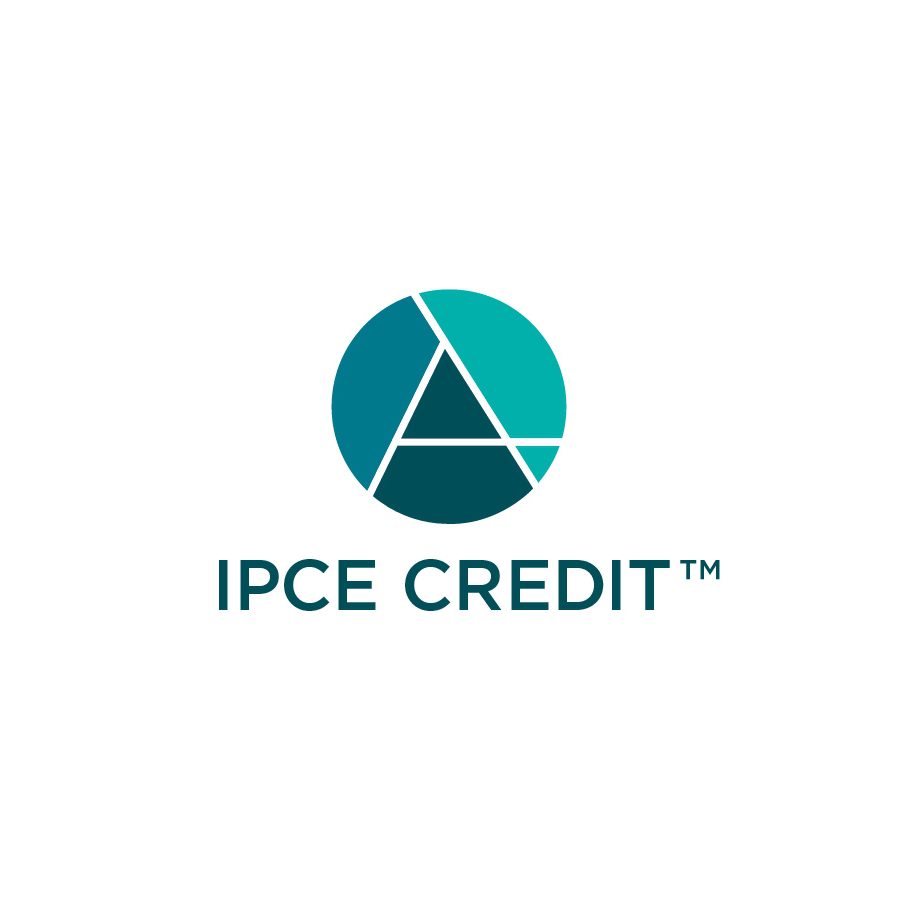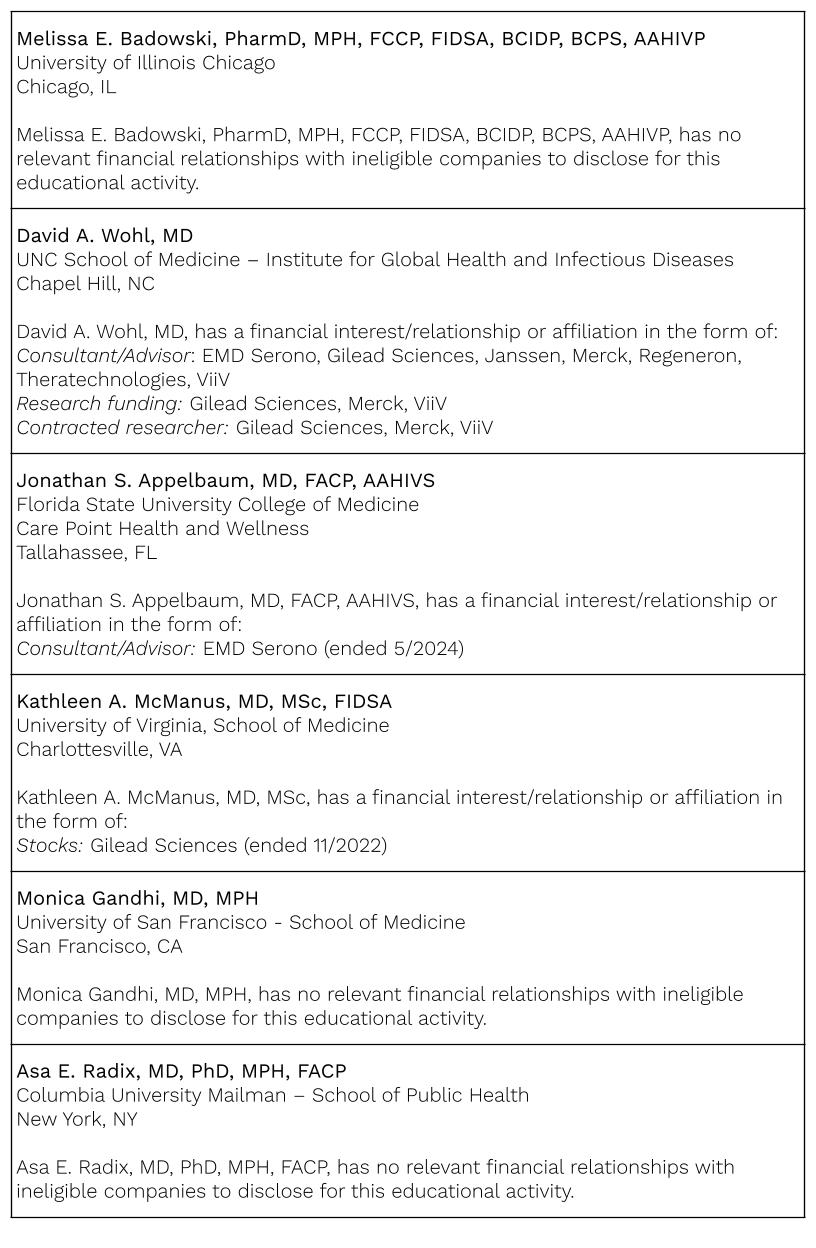
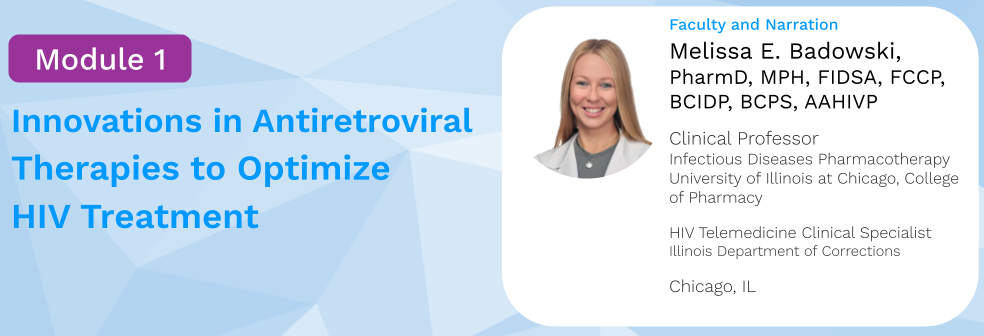
Faculty: Melissa E. Badowski, PharmD, MPH, FCCP, FIDSA, BCIDP, BCPS, AAHIVP
Course Description
This module provides an update on recommended and investigational ARV therapies for optimal HIV care and treatment in HIV care, primary care, and general medicine.
Educational Objectives
Upon completion of this activity, participants should be able to:
- Describe recent updates to HIV treatment guidelines, including guidance for optimal HIV treatment in HIV care and primary care settings
- Explain innovations in antiretroviral therapy (ART), such as long-acting injectable ART (LA ART)
- Identify strategies to monitor patient response to therapy and HIV treatment adherence
- Discuss switching patients to more simplified HIV treatment regimens

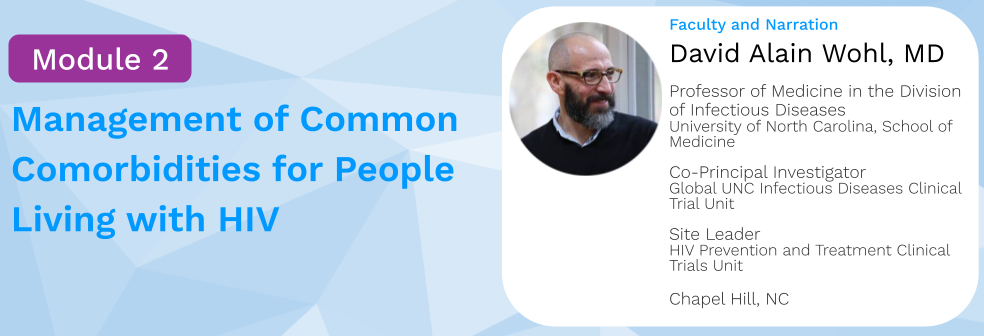
Faculty: David A. Wohl, MD
Course Description
This module provides considerations for managing and preventing common comorbidities, co-infections and opportunistic infections among PWH.
Educational Objectives
Upon completion of this activity, participants should be able to:
- Identify common comorbidities and co-infections (CIs) among people with HIV and their impact on treatment decisions
- Summarize recent updates to HIV treatment guidelines related to co-infections and opportunistic infections (OIs)
- Identify strategies to manage common comorbidities and co-infections, including notable medication contraindications
- Explain the importance of prevention and wellness discussions with PWH, that includes vaccinations, to reduce impact of CIs and OIs

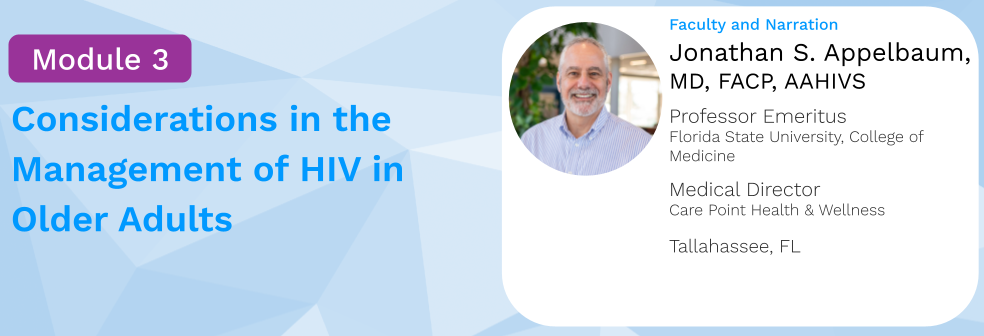
Faculty: Jonathan S. Appelbaum, MD, FACP, AAHIVS
Course Description
This module provides considerations for managing HIV care among older adults and long-term HIV survivors.
Educational Objectives
Upon completion of this activity, participants should be able to:
- Identify common comorbidities most prevalent in older adults with HIV, based on findings from the REPRIEVE study
- Discuss strategies and special considerations for managing HIV care in older adults who did not initiate early start on treatment
- Evaluate the potential impact of long-term antiretroviral therapy on cardiometabolic risk and other comorbidities in older adults and long-term HIV survivors
- Develop strategies for managing both antiretroviral therapy and cardiometabolic risk factors in patients with HIV

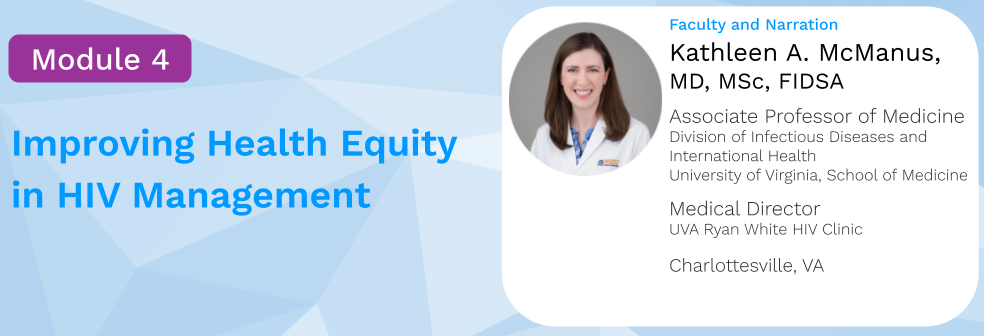
Faculty: Kathleen A. McManus, MD, MSc, FIDSA
Course Description
This course provides evidence-based HIV treatment optimization strategies for delivering quality HIV care among key populations.
Educational Objectives
Upon completion of this activity, participants should be able to:
- Explain inequities in HIV and social determinants of health impacting people with HIV (PWH)
- Describe intersectionality of social determinants of health that impact HIV treatment among key populations
- Identify model practices for optimizing HIV management/treatment among patients with competing priorities (e.g. persons experiencing homelessness, substance use disorders, transgender persons, young adults)

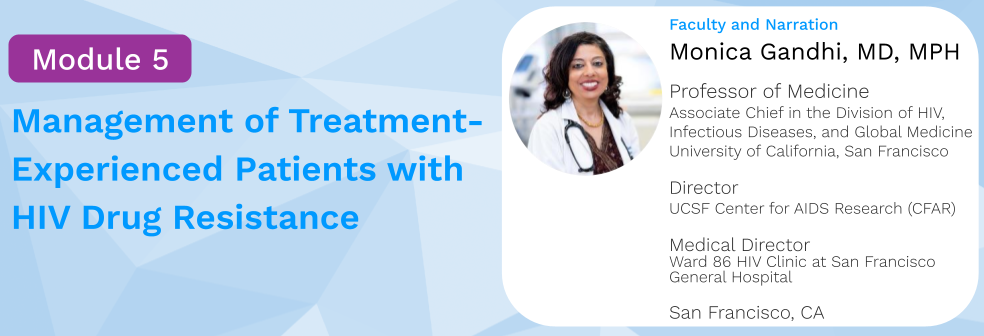
Faculty: Monica Gandhi, MD, MPH
Course Description
This course provides information on the latest strategies for managing treatment of patients with HIV drug resistance.
Educational Objectives
Upon completion of this activity, participants should be able to:
- Identify impacts of HIV drug resistance on patients and communities
- Identify the causes of virologic failure and methods to assess virologic failure and HIV drug resistance
- Identify steps for constructing new treatment regimens for patients with HIV drug resistance
- Identify considerations for special populations with HIV drug resistance

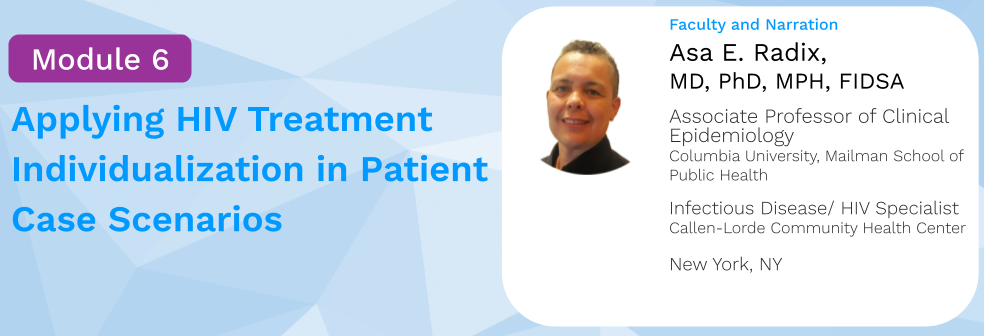
Faculty: Asa E. Radix, MD, PhD, MPH, FIDSA
Course Description
This module offers comprehensive patient cases that require learners to apply knowledge from Modules 1-5 in case-based scenarios.
Upon completion of this activity, participants should be able to:
- Evaluate HIV management needs of older adults with HIV
- Identify unique considerations of HIV management for transgender women
- Apply HIV treatment knowledge to determine optimal ART regimens for patients
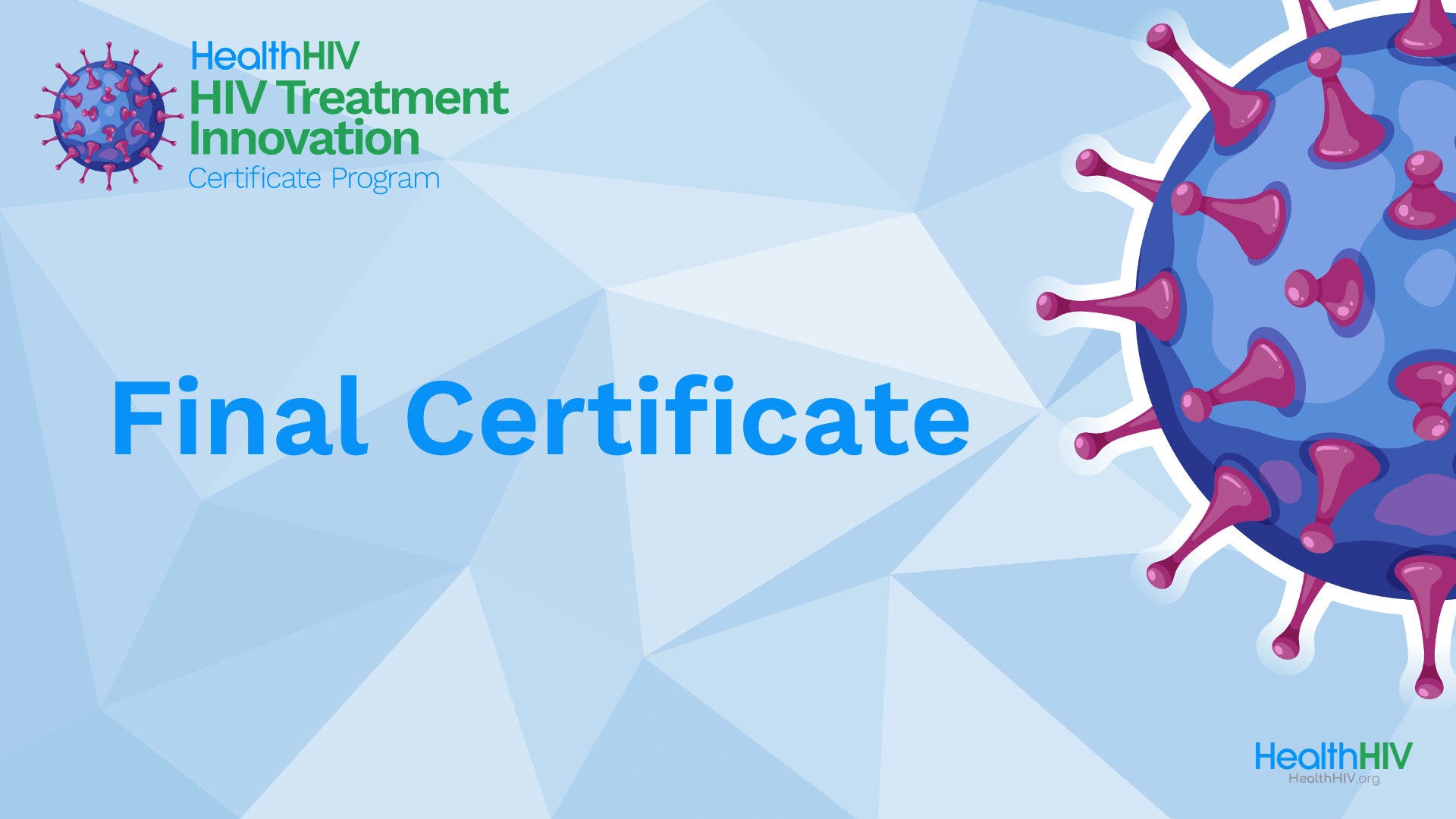
After completion of all five modules, please select to receive your final certificate.


 The European Union of Medical Specialists-European Accreditation Council for Continuing
Medical Education (UEMS-EACCME®) has an agreement of mutual recognition of continuing medical education (CME) credit with the American Medical Association (AMA). European physicians interested in converting AMA PRA Category 1 Credit(s)™ into European
CME credit (ECMEC®) should contact the UEMS (
The European Union of Medical Specialists-European Accreditation Council for Continuing
Medical Education (UEMS-EACCME®) has an agreement of mutual recognition of continuing medical education (CME) credit with the American Medical Association (AMA). European physicians interested in converting AMA PRA Category 1 Credit(s)™ into European
CME credit (ECMEC®) should contact the UEMS (